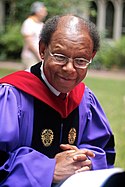James H. Cone Quote
The lynching tree—so strikingly similar to the cross on Golgotha—should have a prominent place in American images of Jesus’ death. But it does not. In fact, the lynching tree has no place in American theological reflections about Jesus’ cross or in the proclamation of Christian churches about his Passion. The conspicuous absence of the lynching tree in American theological discourse and preaching is profoundly revealing, especially since the crucifixion was clearly a first-century lynching. In the lynching era, between 1880 to 1940, white Christians lynched nearly five thousand black men and women in a manner with obvious echoes of the Roman crucifixion of Jesus. Yet these Christians did not see the irony or contradiction in their actions.
The lynching tree—so strikingly similar to the cross on Golgotha—should have a prominent place in American images of Jesus’ death. But it does not. In fact, the lynching tree has no place in American theological reflections about Jesus’ cross or in the proclamation of Christian churches about his Passion. The conspicuous absence of the lynching tree in American theological discourse and preaching is profoundly revealing, especially since the crucifixion was clearly a first-century lynching. In the lynching era, between 1880 to 1940, white Christians lynched nearly five thousand black men and women in a manner with obvious echoes of the Roman crucifixion of Jesus. Yet these Christians did not see the irony or contradiction in their actions.
Related Quotes
About James H. Cone
Cone's work was influential from the time of the book's publication and his work remains so today. His work has been both used and critiqued inside and outside the African-American theological community. He was the Charles Augustus Briggs Distinguished Professor of Systematic Theology at Columbia University-affiliated Union Theological Seminary until his death.
